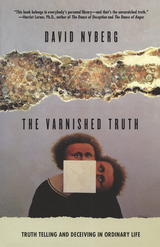
What might we learn if the study of ethics focused less on hard cases and more on the practices of everyday life? In Everyday Ethics, Michael Lamb and Brian Williams gather some of the world’s leading scholars and practitioners of moral theology (including some GUP authors) to explore that question in dialogue with anthropology and the social sciences. Inspired by the work of Michael Banner, these scholars cross disciplinary boundaries to analyze the ethics of ordinary practices—from eating, learning, and loving thy neighbor to borrowing and spending, using technology, and working in a flexible economy. Along the way, they consider the moral and methodological questions that emerge from this interdisciplinary dialogue and assess the implications for the future of moral theology.


The Varnished Truth takes us beyond philosophical speculation and clinical analysis to give us a sense of what it really means to tell the truth. As Nyberg lays out the complexities involved in leading a morally decent life, he compels us to see the spectrum of alternatives to telling the truth and telling a clear-cut lie.
READERS
Browse our collection.
PUBLISHERS
See BiblioVault's publisher services.
STUDENT SERVICES
Files for college accessibility offices.
UChicago Accessibility Resources
home | accessibility | search | about | contact us
BiblioVault ® 2001 - 2024
The University of Chicago Press









